英语书面表达之常用插入语
常见插入语
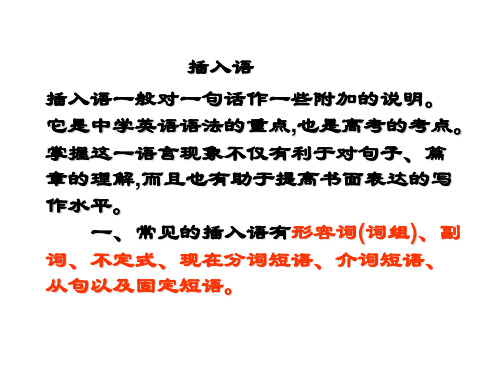
• That‘s a good idea, to be sure! To make things worse, many of the men have gone off to cities in search of higher pay.
• 3.常见的现在分词短语有:generally speaking; frankly speaking; judging from/by; talking of(谈到); considering(考虑到,因为是);putting it mildly(说得客气一点)等。这些分词用来修 饰全句。例如:
5. His father came home [C] at midnight, and ________, he was drunk. A. as a result B. that is to say C. what's more D. sooner or later
• Besides, I enjoy learning about new things from politics to sports and music. • He knows three foreign languages, namely, English, Japanese and Spanish. 但是有些词或短语可插在句子中, 不用逗号隔开。例如: What on earth are you doing here?
• In a way, I think we both won in the game. • 5.常见的从句有:if you don't mind; if you like; if you please; if necessary; if any; if I may say so; if convenient; as it happens等。例 如: [A] come to join us You can, ________, in the game. A. if you please B. if you possible C. if you happy D. if you necess It is always difficult being in a foreign country, [D] ________if you don't speak the language. (NMET2000) A. extremely B. naturally C. basically D. especially
插入语

10. 用标点符号引导插入语 如:He was (strange as it seems)an excellent sportsman. 他(尽管还显得令人不解)是个出 色的运动员。 He was -to me at least, if not to you-a figure that was worth having pity on. 至少我觉得如此,即使你不这样认为,他是 一个值得同情的人。 插入语是做插入成分,补充 说明限定作用,去掉不影响原句结构 what do you think I should tell Tom?这里去 掉do you think影响原句结构,是怎么回事? 不要绝对地去理解这里的不影响结构。因为这里 插入语本身就是一疑问语序了,所以不再用疑问 语序了。如果去掉了,当然要改语序。
7. ____ I had time, I would have played it again. A. If B. Unless C. Had D. When 8. ____ it rain tomorrow, I’d stay at home. A. Should B. Would C. When D. If
9. I like sports and ____ my brother. A. so B. so does C. so is D. so likes 10. Francis, ____ born in Kentucky, lived and practised law in Missouri. A. was B. He was C. who is D. although
practice
3. ---- Do you think it will snow tomorrow? ---- ____. A. No, I don’t think B. I don’t think C. No, I don’t so D. I don’t think so 4. ---- Will he fail in the exam? ---- ____. A. Don’t hope to B. Let’s hope not C. Not hope so D. Let’s hope not to
英语中常见的8种插入语形式
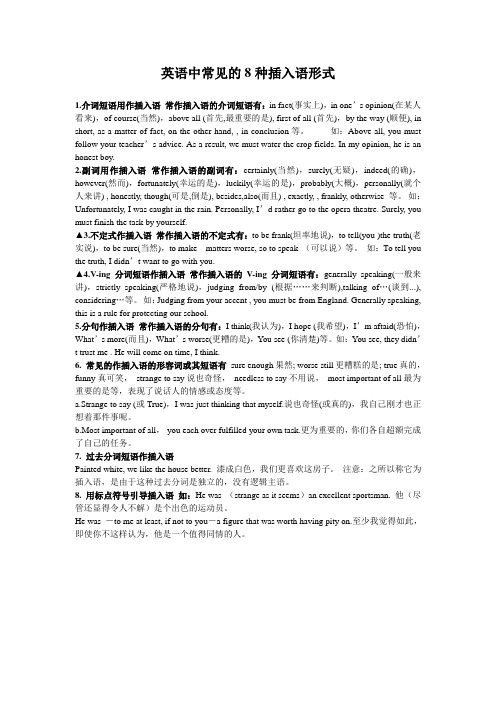
英语中常见的8种插入语形式1.介词短语用作插入语常作插入语的介词短语有:in fact(事实上),in one’s opinion(在某人看来),of course(当然),above all (首先,最重要的是), first of all (首先),by the way (顺便), in short, as a matter of fact, on the other hand, , in conclusion等。
如:Above all, you must follow your teacher’s advice. As a result, we must water the crop fields. In my opinion, he is an honest boy.2.副词用作插入语常作插入语的副词有:certainly(当然),surely(无疑),indeed(的确),however(然而),fortunately(幸运的是),luckily(幸运的是),probably(大概),personally(就个人来讲) , honestly, though(可是,倒是), besides,also(而且) , exactly, , frankly, otherwise 等。
如:Unfortunately, I was caught in the rain. Personally, I’d rather go to the opera theatre. Surely, you must finish the task by yourself.▲3.不定式作插入语常作插入语的不定式有:to be frank(坦率地说),to tell(you )the truth(老实说),to be sure(当然),to make matters worse, so to speak (可以说)等。
如:To tell you the truth, I didn’t want to go with you.▲4.V-ing 分词短语作插入语常作插入语的V-ing分词短语有:generally speaking(一般来讲),strictly speaking(严格地说),judging from/by (根据……来判断),talking of…(谈到...), considering…等。
常见英语插入语
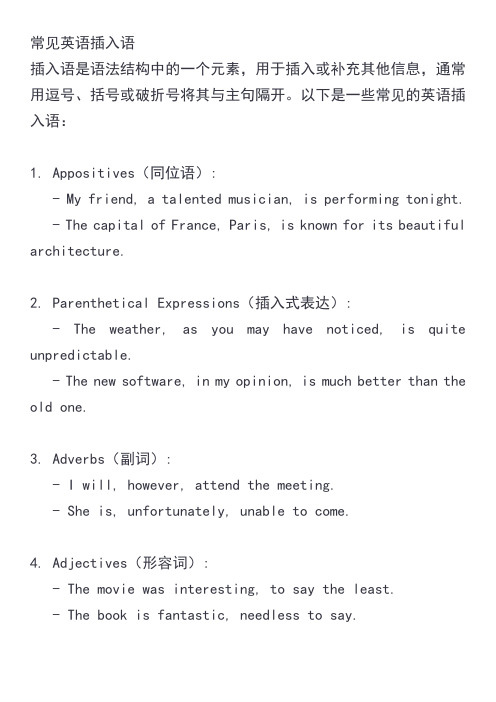
常见英语插入语插入语是语法结构中的一个元素,用于插入或补充其他信息,通常用逗号、括号或破折号将其与主句隔开。
以下是一些常见的英语插入语:1. Appositives(同位语):- My friend, a talented musician, is performing tonight. - The capital of France, Paris, is known for its beautiful architecture.2. Parenthetical Expressions(插入式表达):- The weather, as you may have noticed, is quite unpredictable.- The new software, in my opinion, is much better than the old one.3. Adverbs(副词):- I will, however, attend the meeting.- She is, unfortunately, unable to come.4. Adjectives(形容词):- The movie was interesting, to say the least.- The book is fantastic, needless to say.5. Exclamatory Expressions(感叹表达):- That was a great game, by the way!- Well, I never expected to see you here!6. Interrupters(打断语):- The professor, by the way, will be joining us shortly. - The weather, on the other hand, is perfect for a picnic.7. Quotations(引语):- He said, "I'll be there on time."- We heard the announcement, "The train is delayed."8. Direct Address(直接地址):- Jane, please pass me the salt.- Ladies and gentlemen, welcome to the event.这些插入语的使用能够使句子更加生动、具体,并且能够为读者提供额外的信息或情感色彩。
高考英语作文20条超级实用的插入语
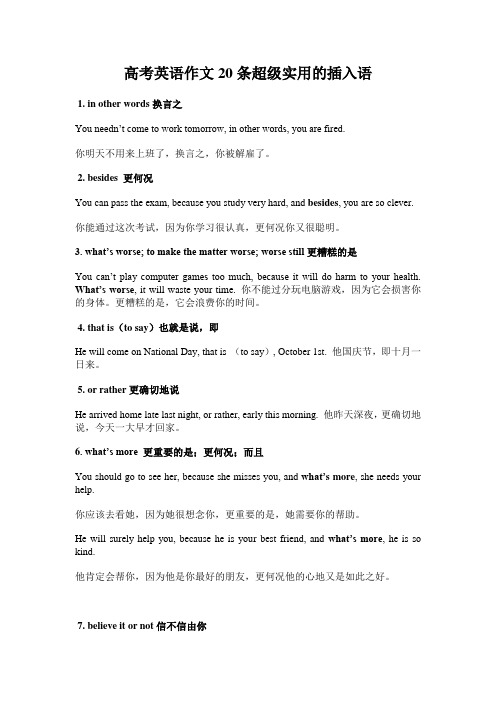
高考英语作文20条超级实用的插入语1. in other words 换言之You needn’t come to work tomorrow, in other words, you are fired.你明天不用来上班了,换言之,你被解雇了。
2. besides 更何况You can pass the exam, because you study very hard, and besides, you are so clever. 你能通过这次考试,因为你学习很认真,更何况你又很聪明。
3. what’s worse; to make the matter worse; worse still更糟糕的是You can’t play computer games too much, because it will do harm to your health. What’s worse, it will waste your time. 你不能过分玩电脑游戏,因为它会损害你的身体。
更糟糕的是,它会浪费你的时间。
4. that is(to say)也就是说,即He will come on National Day, that is (to say), October 1st. 他国庆节,即十月一日来。
5. or rather 更确切地说He arrived home late last night, or rather, early this morning. 他昨天深夜,更确切地说,今天一大早才回家。
6. what’s more 更重要的是;更何况;而且You should go to see her, because she misses you, and what’s more, she needs your help.你应该去看她,因为她很想念你,更重要的是,她需要你的帮助。
He will surely help you, because he is your best friend, and what’s more, he is so kind.他肯定会帮你,因为他是你最好的朋友,更何况他的心地又是如此之好。
插入语
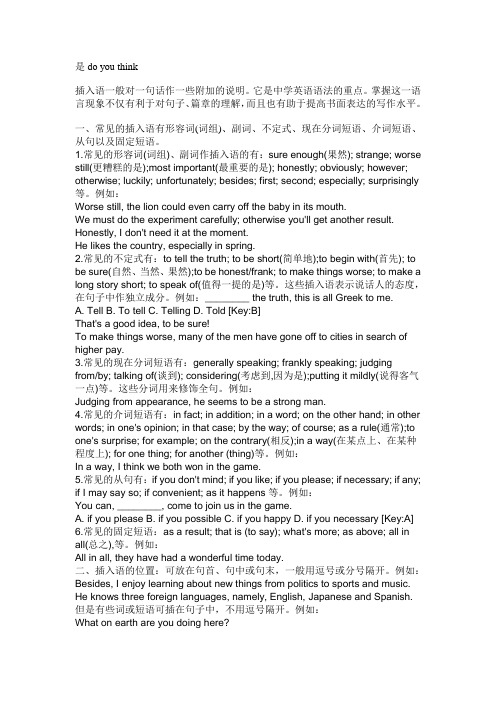
是do you think插入语一般对一句话作一些附加的说明。
它是中学英语语法的重点。
掌握这一语言现象不仅有利于对句子、篇章的理解,而且也有助于提高书面表达的写作水平。
一、常见的插入语有形容词(词组)、副词、不定式、现在分词短语、介词短语、从句以及固定短语。
1.常见的形容词(词组)、副词作插入语的有:sure enough(果然); strange; worse still(更糟糕的是);most important(最重要的是); honestly; obviously; however; otherwise; luckily; unfortunately; besides; first; second; especially; surprisingly 等。
例如:Worse still, the lion could even carry off the baby in its mouth.We must do the experiment carefully; otherwise you'll get another result. Honestly, I don't need it at the moment.He likes the country, especially in spring.2.常见的不定式有:to tell the truth; to be short(简单地);to begin with(首先); to be sure(自然、当然、果然);to be honest/frank; to make things worse; to make a long story short; to speak of(值得一提的是)等。
这些插入语表示说话人的态度,在句子中作独立成分。
例如:________ the truth, this is all Greek to me.A. TellB. To tellC. TellingD. Told [Key:B]That's a good idea, to be sure!To make things worse, many of the men have gone off to cities in search of higher pay.3.常见的现在分词短语有:generally speaking; frankly speaking; judgingfrom/by; talking of(谈到); considering(考虑到,因为是);putting it mildly(说得客气一点)等。
英语作文万能插入语
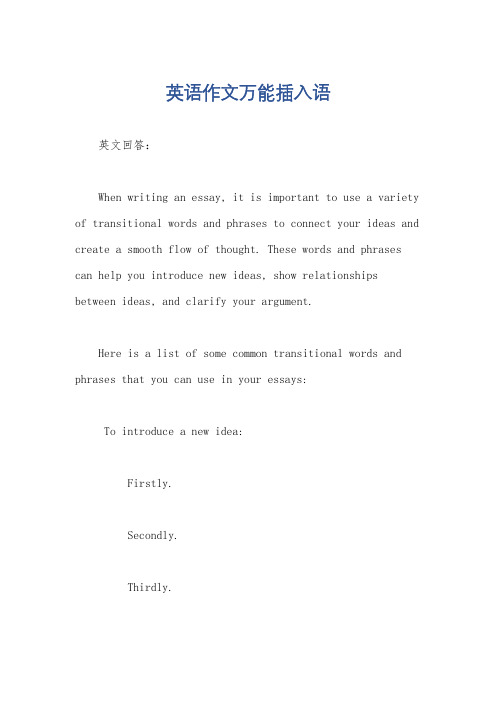
英语作文万能插入语英文回答:When writing an essay, it is important to use a variety of transitional words and phrases to connect your ideas and create a smooth flow of thought. These words and phrases can help you introduce new ideas, show relationships between ideas, and clarify your argument.Here is a list of some common transitional words and phrases that you can use in your essays:To introduce a new idea:Firstly.Secondly.Thirdly.In addition.Furthermore.Moreover.To show relationships between ideas: Because.Since.As a result.Therefore.Consequently.Hence.To clarify your argument:For example.For instance.In other words.To put it another way.That is to say.中文回答:在撰写文章时,使用各种过渡词和短语至关重要,它们可以连接思想,使文章脉络清晰流畅。
这些词和短语可以帮助你提出新思想,展示思想之间的关系,阐明你的论点。
以下是你在文章中可以使用的一些常见过渡词和短语:引出新思想:首先。
第三。
此外。
而且。
此外。
表示思想之间的关系:因为。
因为。
因此。
因此。
由此。
澄清论点:例如。
例如。
英语中的插入语

08
从句
如:if so / not / any, if I may say so, if you don’t mind, as you know, as you say 等。 If I may say so, we know nothing about it.
was worth having pity on. 至少我觉得如此,即使你不这样认为,他是一个值
得同情的人。
感谢您的观看
still otherwise 等。 Luckily for you, I happen to have the key.
你很运气,我正好带了钥匙。
03
介词短语作插入语
如:of course, in short, as a matter of fact, by the way, on the other hand, in my opinion, in conclusion等。 In short, we should not stop halfway. 简言之,我们不能半途而废。 As a result, they suffered heavy losses. 结果,他们受到了严重损失。
说到唱歌,你今晚愿意和我一块去音乐会吗?
05
过去分词短语作插入语
Painted white, we like the house better. 漆成白色,我们更喜欢这房子。
注意:之所以称它为插入语,是由于这种过去分 词是独立的,没有逻辑主语。
06
动词不定式
如:to be sure, to be frank(坦率地说),to tell you the truth(说实话),so to speak (可以说)等。 To be frank, I don’t quite agree with you. 坦率地说,我不太同意你的意见。 That’s a wonderful idea, to be sure. 这个主意好极了,的确。
- 1、下载文档前请自行甄别文档内容的完整性,平台不提供额外的编辑、内容补充、找答案等附加服务。
- 2、"仅部分预览"的文档,不可在线预览部分如存在完整性等问题,可反馈申请退款(可完整预览的文档不适用该条件!)。
- 3、如文档侵犯您的权益,请联系客服反馈,我们会尽快为您处理(人工客服工作时间:9:00-18:30)。
各类型插入语
因果:as a result(因此),therefore (因此),because of that(正因如此),
平行关系:both…and(既…又,都),as well as(也),not only…but also (不但…而且),
顺序:at the same time(同时),at the very beginning(开始,最初),firstly(首先),(最后说来),to start/begin with(首先),
举例:like(像),such as(例如),for example(比如说),and so on
(等等),likewise(同理,像这样),similarly(相同地,同样地),
对比:in the same way(同样地),just as(正如),on the one hand...on the other hand(一方面...另一方面),in common with…(与…一样),compared with…(与…相比较),
转折:though,however,on the contrary(正相反,然而,可是,相反地),contrarily(相反地,相对地),nevertheless(然而,不过),
强调:really(真的,确实),indeed (确实),certainly(一定),surely (确定),above all(首先,尤其是,尤其重要的是),most important of all(最重要的是),after all(毕竟,终究),exactly(确切地,恰好地),
递进:besides (除…之外),otherwise(不然的话,除此以外),in addition(to)(另外,除...之外),furthermore(此外,而且,再者),moreover(并且,加之,此外),or rather(更确切地说,倒不如说),
总结:at last(最后),in brief(简短地,总之),to sum up(总之,概括地说),in a word(总之一句话),in conclusion(最后,总结),in short(简短地,总的来说),as far as I know(就我所知),in the end (最后),in fact(实际上)= as a matter of fact(事实上),honestly=to be honest(诚实地,老实说)= to tell the truth (老实说)=frankly(坦白地,坦率地说),
V-ing形式:generally speaking(一般而言),talking of(谈到,至于),considering(就…而论,考虑到),
句子作插入语:I am sure,I believe,I think,I know,I suppose,I hope,I’m afraid,you see,what’s more (而且),that is to say(那就是说),as we know(众所周知),believe it or not(不管你信不信),
常用过渡词①:in one’s opinion (在某人看来),in other words(换言之,换个说法是),of course(当然),by the way(顺便说),as a
result(因此),at the same time(同时),in a word(总之一句话),in short(简短地,总的来说),as far as I know(就我所知),to be honest (诚实地,老实说),just as(正如),what’s more(而且),as we know (众所周知),
②generally(通常,一般地)=in general(一般地),personally(亲自,就本人而言),at the very beginning(开始,最初),to
start/begin with(首先),for instance (例如),likewise(同理,像这样),similarly(相同地,同样地),
otherwise(不然的话,除此以外),in addition(to)(另外,除...之外),furthermore(此外,而且,再者),moreover(并且,加之,此外),or rather(更确切地说,倒不如说),therefore(因此),on the contrary (正相反,然而,可是,相反地),to sum up(总之,概括地说),in conclusion(最后,总结),that is to say(那就是说),believe it or not (不管你信不信),talking of(谈到,至于),considering(就…而论,考虑到),in the same way(同样地),in common with…(与…一样),。
